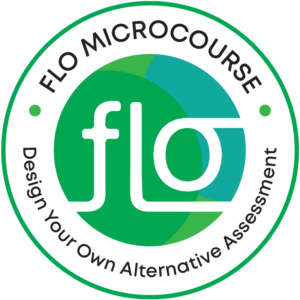 Alternative assessments — activities that allow learners to demonstrate their learning in formats other than traditional quizzes and tests — have risen to prominence during the pandemic. These forms of assessment not only are used for summative evaluation of learners (to provide a grade) but also to help learners develop their understanding of course content, apply it, and link it to other topics and previous understanding. They are typically scaffolded, giving learners feedback along their development and an opportunity to incorporate that feedback and improve their work. They contribute to creating more accessible, equitable educational experiences and can create a culture of academic integrity. Examples of alternative assessments include concept maps, conference presentations, case studies, escape rooms, and authentic tasks that replicate workplace activities. They can be implemented in every discipline. In this FLO MicroCourse, you will learn about the principles of alternative assessments and explore several formats. Then you will apply these principles to the creation of an alternative assessment for your classroom and develop ways to provide feedback to learners on their work. Finally, you will showcase your creation to your peers and discuss ways to bolster the assessment’s effectiveness.
Alternative assessments — activities that allow learners to demonstrate their learning in formats other than traditional quizzes and tests — have risen to prominence during the pandemic. These forms of assessment not only are used for summative evaluation of learners (to provide a grade) but also to help learners develop their understanding of course content, apply it, and link it to other topics and previous understanding. They are typically scaffolded, giving learners feedback along their development and an opportunity to incorporate that feedback and improve their work. They contribute to creating more accessible, equitable educational experiences and can create a culture of academic integrity. Examples of alternative assessments include concept maps, conference presentations, case studies, escape rooms, and authentic tasks that replicate workplace activities. They can be implemented in every discipline. In this FLO MicroCourse, you will learn about the principles of alternative assessments and explore several formats. Then you will apply these principles to the creation of an alternative assessment for your classroom and develop ways to provide feedback to learners on their work. Finally, you will showcase your creation to your peers and discuss ways to bolster the assessment’s effectiveness.
By the end of this FLO MicroCourse, participants will be able to:
- Describe the principles of alternative assessment.
- Design an alternative assessment using the principles of alternative assessment.
- Evaluate the alternative assessment plan.
Estimated Time Commitment:
This course will run for five days. (The weekend is available to wrap up tasks.)
- Participants should allocate 60 to 90 minutes each day for this course.
- Participants will participate in four discussion forums.
- There will be two synchronous meetings. Monday, October 24, 2022, 12:00–1:00 p.m. PT and Friday, October 28, 10:00–11:00 a.m. PT. While both sessions will be recorded for those who can’t attend, your attendance at these sessions is encouraged.
FLO facilitators:
Eliana El Khoury, PhD, (she/her) is an assistant professor at Athabasca University. She has extensive experience in teaching and learning in K–12 and higher education settings both in Canada and internationally. Her work focuses on alternative assessment, education in emergencies, and innovation in teaching and learning. Eliana’s latest work includes training teachers in alternative ways of doing assessments. Dr. El Khoury has received multiple grants to conduct research and has published and presented on STEM education, equity in education, and alternative assessments. Her current research interests include:
- Alternative assessment in multiple disciplines
- Innovation in teaching and learning
- Open education
- Equity in assessment practices
Eliana’s latest work includes a social media campaign that showcases the work of champions of reimagined assessment. You can follow Eliana’s work on alternative assessment on these channels:
- YouTube: Eliana El Khoury
- Linkedin: Alternative Assessment
- Twitter: @elianaelkhoury
Annie Prud’homme-Généreux, PhD, (she/her) was founding faculty at Quest University and is a past recipient of the National Association of Biology Teachers’ Teaching Innovation Award. She is currently the director of Continuing Studies at Capilano University. This spring, she co-facilitated the Commonwealth of Learning MOOC on Authentic Assessment, which brought together over 2,500 educators from around the world. She is completing a master’s degree in open, digital, and distance education at Athabasca University, where she is working with Dr. El Khoury to review the forms of alternative assessments used in post-secondary STEM fields.
To read Annie’s full bio, visit Meet the FLO Facilitator: Annie Prud’homme-Généreux.
This MicroCourse has a non-refundable registration fee of $25.
Register now!
This notice is to inform you that this session will be recorded, archived, and made available publicly on BCcampus.ca. By participating in this session, you acknowledge that your participation in this session will be recorded and the recording will be made available openly.
